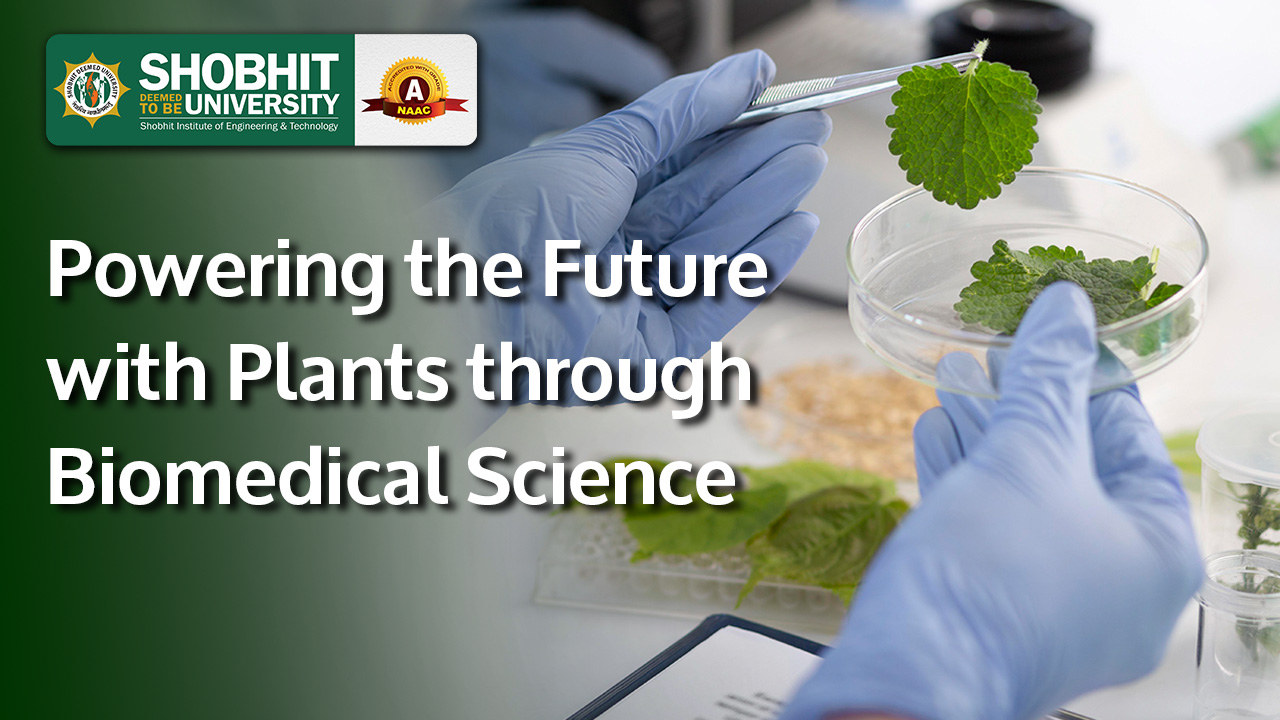
Powering the Future with Plants through Biomedical Science
Exploring a Green Frontier in Biomedical Science and Engineering
As the world races to tackle climate change, energy scarcity, and health challenges, biomedical science and engineering stand at the crossroads of innovation and sustainability. Recent advancements—like using succulent plants as living solar cells—highlight how biological systems can generate clean electricity. These breakthroughs not only capture scientific curiosity but also signal the transformative role of biomedical disciplines in shaping our sustainable future.
Students pursuing M.Sc. Biomedical Sciences or Biomedical Engineering have the unique opportunity to contribute to this evolving landscape, combining biology, physics, chemistry, and technology to build impactful solutions for global challenges.
The Power of Plants: Biology Meets Energy
What if plants could do more than just photosynthesize? Recent research has shown that succulent leaves, like those of the ice plant, can be embedded with electrodes to extract real-time electrical energy. In one experiment: A voltage of 0.28V was generated from a single leaf Under light, it produced 20 µA/cm² of photocurrent The system remained functional for over 24 hours These developments represent a new class of green energy sources, born from the interface of plant biology and electrochemical systems—a space where biomedical engineers and scientists can thrive.
National and Global Status of Biomedical Innovation
Biomedical science is no longer a support field; it is a core engine of technological progress.
Globally: Institutions like MIT, Harvard, and ETH Zurich are developing bio-hybrid Technologies. The EU Green Deal funds biotechnological solutions for health and energy. The US Department of Energy supports plant-based energy research.
Nationally (India): DBT, DST, and BIRAC fund cutting-edge research in bioenergy, nanomedicine,
and biosensing. Initiatives like Startup India and Make in India encourage academic- entrepreneurial translation. Premier institutes like IITs, IISc, and NIPERs focus on biomedical innovations for public health. Biomedical graduates in India are now seen as drivers of innovation, not just lab workers or assistants.
Career Opportunities in Biomedical Sciences
An M.Sc. in Biomedical Sciences or Engineering opens pathways across research, industry, and entrepreneurship.
1. Academic & Research Careers
- Join as a PhD scholar or research associate at top global institutions
- Work in domains like bioenergy, tissue engineering, or molecular diagnostics
- Contribute to ICMR, CSIR, DRDO, or international R&D hubs
2. Industry Roles
- Biotech and MedTech companies hire for roles like:
- Biomedical Device Developer
- Clinical Research Associate
- Biotech Production Analyst
- Pharmaceutical industries, healthcare startups, and diagnostic labs actively seek biomedical expertise
3. Entrepreneurial Ventures
- Startups in green energy, wearable health tech, or biosensors are in high demand
- Access seed funding through: BIRAC BIG, NIDHI-PRAYAS, Startup India grants
- Collaborate with incubators in academic ecosystems to turn research into real-world solutions
Why This Is the Right Time for You
The convergence of biomedical science, sustainability, and technology is creating a revolution in healthcare and energy. As a student of M.Sc. Biomedical Sciences, you’re not just entering a degree program—you’re stepping into a global movement. From powering devices with plants to building life-saving technologies, your future starts here. You’ll gain hands-on experience, work on real-world challenges, and have the chance to contribute to society in ways that matter. Where Biology Meets Innovation. Power the Future with Science. Your future in Biomedical Science and Engineering starts here.
